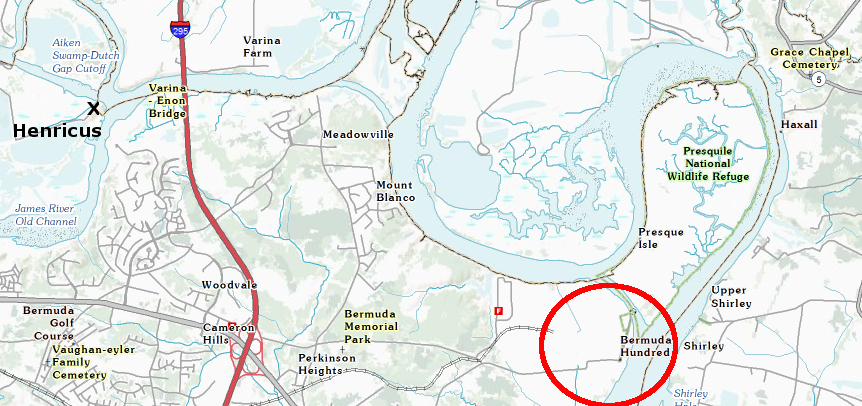
Bermuda Hundred, located between Henricus and Jamestown (just upstream of the mouth of the Appomattox River)
Map Source: US Geological Survey, The National Map
The English who migrated to Virginia knew it would be a dangerous trip, and life in the colony would be hard. Sailors returning from the First, Second, and Third Supplies as well as subsequent voyages would have reported the extraordinary rate of death in the New World.
So why would anyone choose to go?
The greatest incentive for the English settlers was a chance to become economically independent. In 17th Century England, there was little opportunity for an ordinary farmworker to accumulate enough capital to buy a piece of land. Taxes and rents were too high; too much of the profit from a man's labor disappeared into the pockets of the gentry. If you were a father who thought your children were also doomed to work through a life of poverty, or a son who was physically strong but unable to profit from your labor, or a daughter or widow whose only choices for a husband were men with minimal opportunity to provide a life of wealth or social advancement - wouldn't you consider taking a chance on the unknown?
In 17th Century America, however, there was a surplus of land and a shortage of labor. The Spanish attempted to enslave the Native Americans to operate their plantations. The French adopted another strategy for their colonies in Canada and along the Gulf of Mexico. the French made little effort to settle the backcountry, away from the Atlantic Ocean, in order to establish an agriculturally-base colony. The French chose to develop partnerships with the Algonquian and Iroquois tribes, profiting primarily from trade in furs and fish.
The first settlers to come to Virginia were the real gamblers, bold or desperate men. Women arrived early as well, though the sex ratio of the colony was asymmetric and men outnumbered women for the first 50 years. Slaves were first delivered to the Virginia shores in 1619. They did not choose to come, of course, and initially the "peopling" of Virginia was dependent upon voluntary immigration by those in England looking for a chance to "get ahead."
The Virginia Company encouraged immigration into the colony by offering wages initially, plus a chance at sharing in mineral wealth. Entrepreneurs in England were encouraged to bring whole groups to the new colony, establishing their own communities known as "hundreds." Bermuda Hundred was named for such a settlement by Sir Thomas Gates, honoring his experience in Bermuda in 1609-10 after being shipwrecked on the way to Virginia to serve as governor of the colony. (The storm that delayed the arrival of the colony's new leadership may have been the basis for Shakespeare's play, The Tempest.)

There was little economic stability in the colony until 1613, when John Rolfe shipped a crop of "sweet-scented" tobacco grown from seeds imported from the Caribbean (rather than the harsh strain of tobacco that was native to Virginia).
The tobacco exports quickly became the economic basis for the colony. With hard work, those who owned land and had the strong backs required to grow tobacco could accumulate substantial wealth. The English immigrants to Virginia were willing to work for others in Virginia as indentured servants, because their obligations were ended after 7 years and they could start growing tobacco themselves. Land was granted freely - anyone who paid the travel costs to import a person into Virginia was entitled to 50 acres. (At one point, ship captains could claim 50 acres for themselves every time they sailed to the colony...)
The tobacco plantation economy in Virginia was based on cheap land and cheap labor, and easy access to the ships that carried the crop across the Atlantic Ocean. Tobacco is labor-intensive, requiring a full year of labor to gather the tiny seeds, grow them early in the year in cold frames, transplant the seedlings to the outdoor fields when the soil is warm, weed the fields throughout the summer, "top" most plants (to remove the flowers and force more of the plant's energy into the leaves), harvest the leaves as they ripened in August/September, and pack them into barrels known as "hogsheads."
By 1700, it was clear that immigration from Europe and natural increase from local colonists was unable to supply sufficient to work the plantations, as settlement moved into the Piedmont. Virginia imported a huge quantity of slaves after 1700 to provide the labor to grow tobacco. By 1775, slaves who had not voluntarily come to the colony composed 40% of the Virginia population.
Today, the frontiers of new settlement are closed. You have to use your imagination to envision starting a new colony on the ocean floor, or on another planet. The next time you watch the aliens fighting the humans on Star Trek or whatever, see if you can identify the characters that correspond to Powhatan, John Smith, Pocahontas, John Rolfe, plus the nameless indentured servants and slaves who shaped the culture of Virginia. They faced a New World, and were responsible for reshaping it into the Virginia we see today.